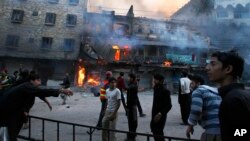ISLAMABAD —
Eight people were killed when gunmen opened fire on a Shi'ite Muslim religious procession in Pakistan on Friday, hospital officials said, in what appeared to be the latest incident of spiralling sectarian violence.
More than 30 others were wounded in the attack, which began when the procession passed a Sunni seminary. Rock throwing quickly degenerated into gunfire, said staff at the district hospital headquarters in the city of Rawalpindi.
The Shi'ites were marking Muharram, an annual Shi'ite day of mourning to mark the death of Imam Hussein, a grandson of the Prophet Mohammad. Many join long processions where they flagellate, beat or cut themselves to show their grief.
Rawalpindi is a few minutes' drive from the capital, Islamabad, and home to the headquarters of Pakistan's army.
Further details of the attack were difficult to ascertain since the government suspended mobile phone services in much of Pakistan during Muharram to try to foil suicide bombers.
Attacks on Pakistan's Shi'ites, who make up about a fifth of the 180 million population, have worsened in recent years.
Most of the attacks are the work of Sunni Muslim extremists, many of whom are affiliated with banned militant groups such as the Taliban or Lashkar-e-Jhangvi, which wants to drive all Shi'ites out of Pakistan.
Hundreds of Shi'ites were killed in bombings and other attacks last year, including children gunned down on their way to school and doctors heading for work.
More than 30 others were wounded in the attack, which began when the procession passed a Sunni seminary. Rock throwing quickly degenerated into gunfire, said staff at the district hospital headquarters in the city of Rawalpindi.
The Shi'ites were marking Muharram, an annual Shi'ite day of mourning to mark the death of Imam Hussein, a grandson of the Prophet Mohammad. Many join long processions where they flagellate, beat or cut themselves to show their grief.
Rawalpindi is a few minutes' drive from the capital, Islamabad, and home to the headquarters of Pakistan's army.
Further details of the attack were difficult to ascertain since the government suspended mobile phone services in much of Pakistan during Muharram to try to foil suicide bombers.
Attacks on Pakistan's Shi'ites, who make up about a fifth of the 180 million population, have worsened in recent years.
Most of the attacks are the work of Sunni Muslim extremists, many of whom are affiliated with banned militant groups such as the Taliban or Lashkar-e-Jhangvi, which wants to drive all Shi'ites out of Pakistan.
Hundreds of Shi'ites were killed in bombings and other attacks last year, including children gunned down on their way to school and doctors heading for work.





